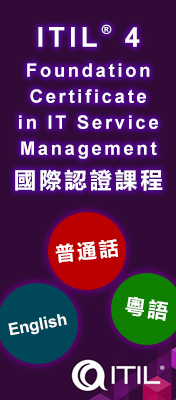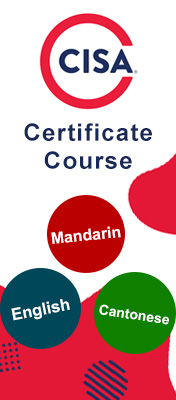|
課程優惠!現凡同時報讀以下兩個課程:
即減 $710!
|
推介服務:課堂錄影隨時睇 (在家觀看 = 0%,在校觀看 = 100%)
學員使用 WhatsApp、電話或本網頁報名,待本中心確認已為學員留位後,即可使用  繳付學費,過程簡便!
繳付學費,過程簡便!
* 各政府部門可使用 P Card 付款
如使用 P Card 繳付考試費,考試費需另加 2.5% 行政費
推介服務:課堂錄影隨時睇 (在家觀看 = 100%,在校觀看 = 0%)
學員使用 WhatsApp、電話或本網頁報名,待本中心確認已為學員留位後,即可使用  繳付學費,過程簡便!
繳付學費,過程簡便!
* 各政府部門可使用 P Card 付款
如使用 P Card 繳付考試費,考試費需另加 2.5% 行政費
注意! 客戶必須查問報讀學校的教育局註冊編號,以確認該校為註冊學校,以免蒙受不必要的損失!
考取認證 : 擁有 OCA Java 8 認證之人士可通過修讀此科去考取 OCP Java 8 認證
認證升級 : 擁有以往版本 OCP Java / SCJP 認證之人士也可通過修讀此科去考升級試從而兼得 OCP Java 8 認證
|
在現今的應用範圍上,Java 語言可說是十分廣泛,從 Windows,Linux 以至手機,都有應用Java 技術。因此 Java 已經成為跨平台及網路軟件的首選。事實上 Java 技術的簡單性和跨平台能力使其成為 I.T. 程式編寫界的標準,這亦是 Java 在 I.T. 界認受性廣泛的主要原因。
OCP: Java SE 8 Programmer 認證函蓋開發 Java 應用程式的主要技術,當中包括最新Lambda, Stream API 及進階的 Java SE 8 DateTime API 功能的運用。此認證專為對有堅實 Java 語言基礎的人士而設,以證明他們有相關技術去開發 Java 程式及懂得運用 Java SE 8 最新的技術來進行優化。
本中心的 OCP: Java SE 8 Programmer 認證課程籌備多時,精心編排。由上堂、溫習、實習、考試研習、做試題至最後考試,均為你度身訂造,作出有系統的編排。務求真正教識你,又令你考試及格。 |
|
| 課程名稱: |
OCP: Java SE 8 Programmer 認證課程
- 簡稱:OCP Java Training Course (SE 8) |
| 課程時數: |
30 小時 (共 10 堂) |
| 適合人士: |
擁有 OCA Java 8 認證之人士 或
擁有以往版本 OCP Java / SCJP 認證之人士 |
| 授課語言: |
以廣東話為主,輔以英語 |
| 課程筆記: |
本中心導師親自編寫英文為主筆記,而部份英文字附有中文對照。 |
| 1. 模擬考試題目: |
本中心為學員提供 1Z0-809 模擬考試題目,每條考試題目均附有標準答案。 |
| 2. 理論與實習並重: |
導師於課堂內講解理論及示範實際例子 |
| 3. 導師親自編寫筆記: |
由本中心導師親自編寫筆記,絕對適合考試及實際編寫 Java 程式之用,令你無須「死鋤」如字典般厚及不適合香港讀書格調的書本。 |
| 4. 免費重讀: |
傳統課堂學員可於課程結束後三個月內免費重看課堂錄影。 |
只要你於下列科目取得合格成績,便可獲 Oracle 頒發 OCP: Java SE 8 Programmer 國際認可證書:
擁有 OCA Java 8 認證之人士:
| 考試編號 |
科目名稱 |
| 1Z0-809 |
Java SE 8 Programmer II |
Oracle 已公佈自 2022 年 9 月 1 日起學員必需親自前往 https://education.oracle.com/buy-exam 購買以下 1 個科目的 "Oracle Exam Attempt" 並由 Oracle 親自向您提供考試服務。
考試編號 1Z0-809 考試費為 US$245
考試題目由 Oracle 傳送到你要應考的電腦,考試時以電腦作答。所有考試題目均為英文,而大多數的考試題目為選擇題。
考試合格後會收到來自 Oracle 的作實電郵,並進入該電郵內的連結,登入 https://certview.oracle.com 下載您的證書。
考試不合格便可於 5 日後重新報考,但 12 個月內最多只可以考 4 次。欲知道作答時間、題目總數、合格分數等詳細考試資料,可瀏覽本中心網頁"各科考試分數資料"。
|
課程名稱:OCP: Java SE 8 Programmer 認證課程
- 簡稱:OCP Java Training Course (SE 8) |
1. Class Design
1.1 A Simple Class Example
1.2 Encapsulation (封裝), Cohesion (內聚) and Coupling (聯結)
1.2.1 Encapsulation
1.2.2 Cohesion
1.2.3 Coupling
1.3 Inheritance and Polymorphism
1.3.1 Inheritance Basics
1.3.2 Adding Fields and Methods to Subclass
1.3.3 Overriding Instance Methods
1.3.4 Hiding Instance Variables
1.3.5 Constructor
1.3.6 Abstract
1.3.7 Final
1.4 Interface
1.4.1 Basic Usage of Interface
1.4.2 Java 8 Default Method
1.5 Composition
1.6 Singleton and Singleton Factory Design
1.6.1 Singleton Design
1.6.2 Singleton Factory Class
1.7 Nested Class and Local Class
1.7.1 Static Nested Classes
1.7.2 Inner Classes
1.7.3 Local Class
1.7.4 Anonymous Class
1.8 Enumerated Type
2. Exception and Assertion
2.1 Exception
2.1.1 Exception Basics
2.1.2 Throwing An Exception
2.1.3 Custom Exception
2.1.4 Chaining Exception
2.1.5 try-with-resources
2.2 Assertion (判定)
2.2.1 Using Assertions
2.2.2 Run with Using Assertions
3. Input Output (I/O)
3.1 I/O Streams
3.1.1 Working of Basic I/O Streams
3.1.2 Byte Streams
3.1.3 Character Streams
3.1.4 Using Array with I/O Streams
3.1.5 I/O Stream Classes with Buffering
3.1.6 Console Input / Output
3.1.7 Introduction to Object Streams
3.2 File I/O using NIO.2
3.2.1 Path Interface and Paths Class
3.2.2 Files Class
3.2.3 Creating Streams from Files Static Methods
3.2.4 FileStore
3.2.5 DirectoryStream
3.3 Legacy File I/O
4. Concurrency
4.1 Introduction to Threads (線程)
4.2 Configuring Threads with Thread Class
4.3 Configuring Threads with Runnable Interface
4.4 Basic Setting and Monitoring for Threads
4.4.1 Threads’ Name
4.4.2 Lifetime of a Thread
4.4.3 Thread Priorities
4.5 Synchronizing (同步) Threads
4.5.1 synchronized (同步)
4.5.2 wait() and notify()
4.6 Deadlock
4.7 java.util.concurrent
4.8 ReentrantLock
4.9 Atomic Variables
4.10 ThreadPools and Callable
4.11 Fork/Join
4.12 CountDownLatch and CyclicBarrier
5. Collections Framework And Generic
5.1 Collections Framework Overview
5.2 Sets
5.2.1 HashSet
5.2.2 TreeSet
5.3 Lists
5.3.1 ArrayList
5.3.2 Synchronized Lists
5.3.3 CopyOnWriteArrayList
5.4 Queue
5.4.1 PriorityQueue
5.4.2 ArrayDeque
5.5 Maps
5.5.1 HashMap
5.5.2 TreeMap
5.6 Generics
5.6.1 Generics Backgound
5.6.2 Using Generics
5.6.3 Generics Types with Wildcard
5.6.4 Optional
6. Lambda
6.1 Lambda Overiew
6.1.1 Lambda Expression
6.1.2 Funtional Interface
6.2 Lamdba Functional Interfaces
6.3 Using Lambda Expression with Methods of some Java Built-in Classes
6.3.1 forEach() declared in Iterable
6.3.2 removeIf() declared in Collection
6.3.3 replaceAll() declared in List:
6.4 Creating Methods to Use Lambda Expression
7. Stream API
7.1 Creating a Stream
7.2 Performing Operations on a Stream
7.3 Stream Pipelines and Processing of Stream Operations
7.4 Examples of Various Stream Operations
7.5 Using Stream for Files
7.5.1 Using Stream through returned List object
7.5.2 Methods returning Stream
8. JDBC
8.1 JDBC Overview
8.2 Basic Example for Using a Database
8.2.1 Connecting to a Database
8.2.2 Preparing and Sending Queries to the Database
8.2.3 Retrieving the Result from the Database
8.2.4 Closing the Resources
8.3 Creating Tables and Updating Data through SQL Statements
8.4 Scrolling and Updating using ResultSet
9. Locale, Resource Bundle and DateTime API
9.1 Locale
9.1.1 Locale Overview
9.1.2 Creating Locale Object
9.1.3 Using Locale in Number Formating
9.1.4 Using Locale in Date Time Formating
9.2 Resource Bundle
9.2.1 Resource Bundle Overview
9.2.2 Property Resource Bundle
9.2.3 More about Properties Files
9.2.4 List Resource Bundle
9.3 Java 8 DateTime API
9.3.1 Creating Objects for Local Date and/or Time
9.3.2 Instance Methods for Java 8 DateTime Classses
9.3.3 Zoned DateTime
9.3.4 Other Clasesses in Java 8 DateTime API
|



